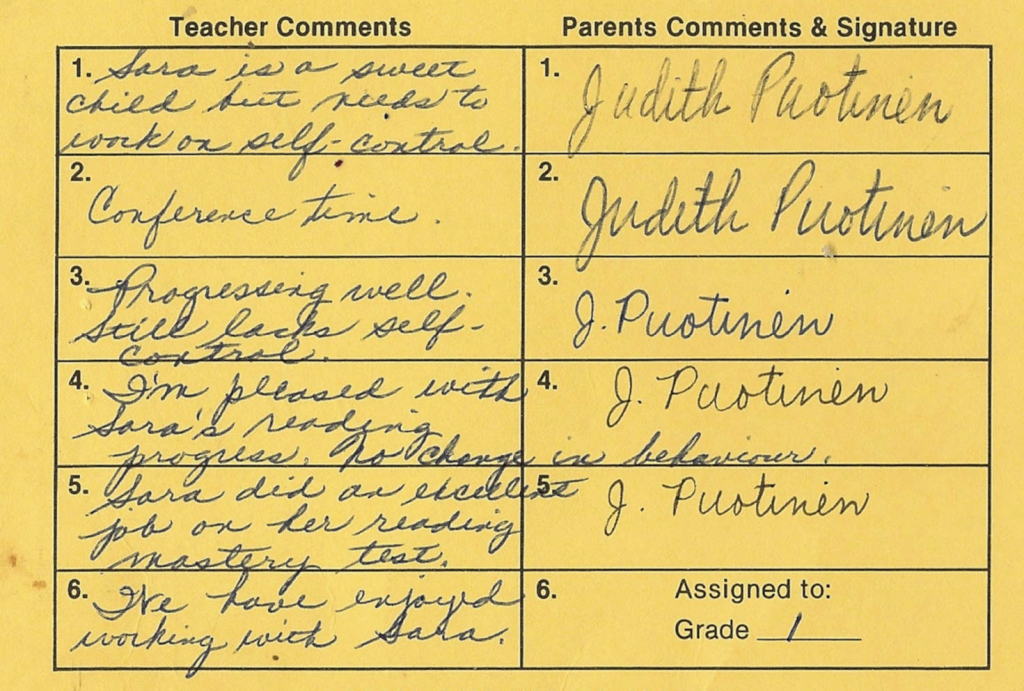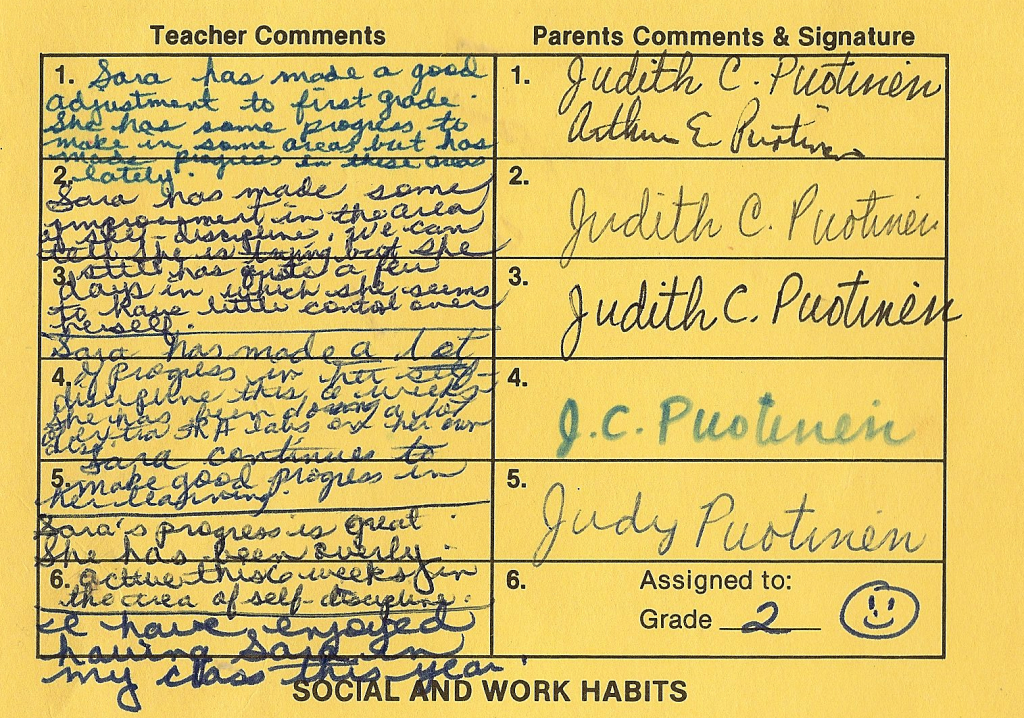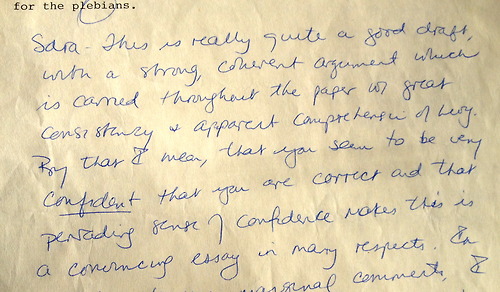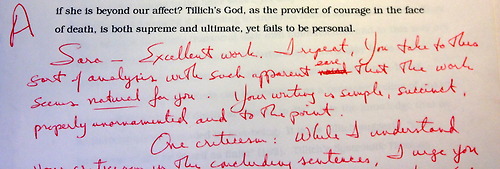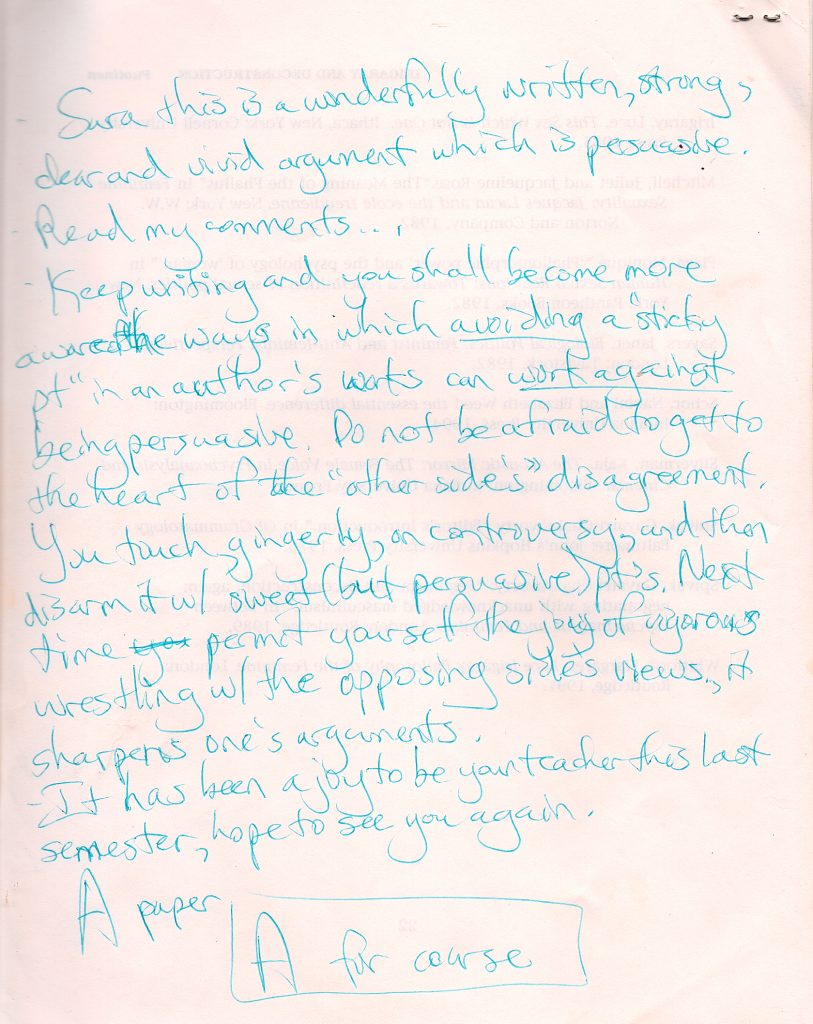A Collection of Teacher Comments, with some commentary.
Report Card, Kindergarten (1979-1980)
- Sara is a sweet child but needs to work on self-control.
- Conference time.
- Progressing well. Still lacks self-control.
- I’m pleased with Sara’s reading progress. No change in behavior.
- Sara did an excellent job on her reading mastery test.
- We have enjoyed working with Sara.
Sara is a sweet child but needs to work on self-control.
Much of my work on trouble is inspired by and in resistance to this statement and the various ways that working on “self-control” was really about getting me to “stop asking questions,” “stop being curious,” and “stop making and being trouble!”
Report Card, First Grade (1980-1981)
- Sara has made a good adjustment to first grade. She has some progress to make in some areas but has made progress in these areas lately.
- Sara has made some improvement in the area of self-discipline. We can tell she is trying but she still has quite a few days in which she seems to have little control over herself.
- Sara has made a lot of progress in her self-discipline this 6 weeks.
- Sara’s progress is great. She has been overly active this 6 weeks in the area of self-discipline.
Comments on the first draft of a history paper (Fall 1992).
Sara – This is really quite a good draft, with a strong, coherent argument which is carried throughout the paper with great consistency and apparent comprehension of history. By that I mean, that you seem to be very confident that you are correct and that pervading sense of confidence makes this a convincing essay in many respects.
This paper was about Livy’s Early History of Rome. I wrote it in my first semester of college, in my Historical Perspectives class. I wanted to include it in my academic/intellectual history because I was intrigued by my professor’s description of my work as confident and convincing. At first glance, I take this as a compliment, but is it? And, is it really a good thing to have “apparent comprehension” and conviction? What about substance?
I have fond memories of this professor’s class and I know that I learned a lot about how to be a better writer. (This paper came at the end of the semester and earned an A; my first paper received a C+.) But, his comment here seems to be describing and praising my ability to bullshit, where substance doesn’t matter as long as you’re confident in your own rightness (and smartness). As I mention in my account, “The Philosophy Boys,” graduate school involved a lot of bullshitting. I don’t like bullshitting, especially the kind in which you understand yourself to be CORRECT and in no need of re-thinking your position so as to take seriously other perspectives.
Comments on a religion paper (Fall 1995)
Sara — Excellent work. I repeat, you take to this sort of analysis with such apparent ease that the work seems natural for you. Your writing is simple, succinct, properly unornamented and to the point.
These comments, from a paper on Paul Tillich and the problem of finitude, demonstrate my aptitude for analysis and pithy, succinct writing in my undergraduate years. I’m fascinate by my professor’s comment: “properly unornamented.” What does it mean to be properly unornamented?
Master’s Professor’s Comments on Critical Theory Paper (1996)
Sara: this is a wonderfully written, strong, clear and vivid argument which is persuasive. …Keep writing and you shall become more aware of the ways in which avoiding a “sticky pt” in an author’s works can work against being persuasive. Do not be afraid to get to the heart of the “other side’s” disagreement. You touch gingerly, on controversy, and then disarm it with sweet (but persuasive) points. Next time permit yourself the joy of vigorous wrestling with the opposing side’s views, it sharpens your argument.
I haven’t really looked at these comments since I got this paper back in December 1996. It’s fascinating to read this beside my history professor’s comment about being persuasive through confidence. Here my master’s professor (and advisor), suggests that a stronger (more effective) argument requires risk, vulnerability and a willingness to engage with other perspectives. The deeper I got into my graduate work, and then my Post-Ph.D teaching, the more I focused on risk and vulnerability and the more I tried to take his advice.
Continue Reading: Elementary School
